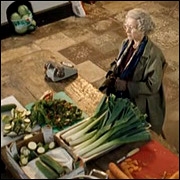
Max Barry, 2003
Premise
Reaction Verdict: Jennifer Government is Snow Crash lite. It lacks the frenetic humor of its predecessor, and the characters are every bit as flat, but it's a decent page-turner. And it's got a great title.
Peter Morgan, Jeremy Brock, Giles Foden, and Kevin Macdonald, 2006
Premise
Reaction I might be interested in seeing the movie all these reviewers seem to pine for. But this movie is about the First World's relationship to the Third, and it does a decent job of being about that. The Last King of Scotland articulates the main thing I found myself musing about after watching, of all things, March of the Penguins. See, after his goons have given the Scottish kid a thorough beating, Amin himself shows up to harangue his former bestest bud. "Did you think this was all a game? 'I will go to Africa, and I will play the white man with the natives!' Is that what you thought? We are not a game, Nicholas. We are real. This room, here — it is real. I think your death will be the first real thing that has happened to you." That's a hell of a speech! And I think it hits on something kind of profound. When you look at your sneakers, you might know on an intellectual level that they were assembled by a ten-year-old girl in a sweatshop in Indonesia — but does that sweatshop feel like a real place? In my on-again off-again hunt for a new place to live I've found myself looking at places and thinking: yes, this is in a better location than my current place... but so what? I spend the vast, vast majority of my free time at home, and when I'm at home, my apartment might as well be floating in a featureless white void. It's easy to fall into the trap of thinking of your affluent corner of the world the same way. But all those other places are real. Look at your house on Google Maps. Found it? Now look at Kampala at the same resolution. Equally real. When you scan the headlines and see the litany of disasters all over the Third World, those are happening to people just as real as you in places just as real as your home. Meanwhile, it's November so the penguin chicks should be in their creches by now. Also equally real.
Peter Morgan and Stephen Frears, 2006
Premise
Reaction Helen Mirren won an Oscar for her portrayal of Elizabeth Windsor, but I was more impressed by Michael Sheen as Tony Blair. For the first couple of minutes I thought, "Gah, this guy doesn't look like Blair at all," but after that I actually forgot that it wasn't the real guy!
I really like leeks. When I got to the scene depicted at right, I had to put this movie on pause. Will you look at those leeks? Are they not the most beautiful leeks you have ever seen?
Non-leek-related commentary The basic conflict in The Queen is generational. Following the death of 1980s icon Diana Spencer, there is a public outpouring of grief. Prime Minister Tony Blair and Diana's ex-husband Charles Windsor, both Baby Boomers, believe that the royal family should acknowledge the public's outpouring of grief. The older generations, represented here by Elizabeth Windsor, her husband Philip Mountbatten, and her mother Elizabeth Bowes-Lyon, believe in keeping a stiff upper lip, the way they did during the war, a much greater catastrophe than the death of a celebutante brat who wasn't a royal anymore anyway. Fine. But why the fuck was there a public outpouring of grief for Diana Spencer in the first place? A while ago I wrote:
And yet! In all three of these texts we see family and government all muddled together. Heck, in Jennifer Government, "Government" is Jennifer's family name. Of course, this is satire. But when Shakespeare trotted out dukes and earls and kings whose "family names" were the names of regions, he quite unsatirically referred to them as "York" and "Northumberland" and "France," as if human beings could serve as incarnations of countries. In The Last King of Scotland, Idi Amin isn't being satirical when he says "Uganda embraces you" and wraps his own arms around Nicholas: he truly believes that he embodies the country — or at least serves as its patriarch. His declaration that "I am the father of this nation, Nicholas, and you have most grossly offended your father!" is echoed in The Queen when one of Tony Blair's aides refers to him (not entirely jokingly) as the "father of the nation." This phrase is such a cliché that its fundamental absurdity tends to get lost. Nations don't have fathers. They're not families. But people really, really, really want them to be. Many people's brains are wired to think analogically and imagine incomprehensibly large agglomerations of people as scaled-up versions of the units they do understand: schoolyards, offices, families. The British royal family serves as a focus for this dysfunctional cathexis, keeping it more separate from the actual government than is the case in a republic. And with that observation I finally realized what the deal was with all those British people wailing in the streets over Diana: The British public is Juliana Hatfield. Or, rather, it's Juliana Hatfield's character in "My Sister." If the structure of the British government is designed to make its citizens — or, rather, subjects — consider themselves part of a family with the royals at the head, then a generation of Britons and Anglophiles was encouraged to view Diana Spencer not as just another media personality with bad hair and way too much mascara, but as your prom queen older sister, or whatever Britain has instead of prom queens. "I love my sister! She's the best! She's cooler than any other girl / That I have ever met!" And then she's dead, before she got to take you to your first all-ages show. Because she would have, y'know. How sad. And all the more sad is that since Tony Blair is just as susceptible as everyone else — in the movie, his wife points out that his increasingly strident defense of the queen's role in British society is probably rooted in mother issues — he went on to build a relationship with George Bush that all too closely resembled that between a nebbishy schoolboy and his brother the idiot fratboy who fucks everything up but whom he nevertheless idolizes and wants to help out. The difference is that the queen eventually listened to people and cared about massive public opposition. Bush, not so much.
Return to the Calendar page! |




